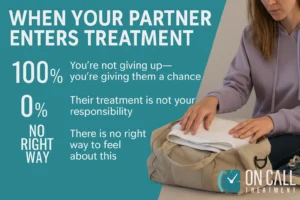You think you’d feel relieved.
You’ve hoped, begged, prayed for them to say yes to help. And now that they finally have, here you are—sitting on the floor, packing their bag like it’s some kind of goodbye.
Toothbrush. Socks. A hoodie that still smells like them.
And while they’re the one going into treatment, your chest feels like it’s the one being cracked open.
If this is you, know this: you are not crazy, and you are not alone. Sending someone you love into residential treatment is one of the bravest, hardest, and most disorienting forms of love there is.
Especially if that person has hurt you. Especially if you still love them.
If you’re navigating this in Waltham, On Call Treatment offers structure, support, and real partnership—so you don’t have to carry it all alone.
You’re Not Giving Up On Them—You’re Giving Them a Chance
There’s a specific kind of ache in helping someone pack for rehab. It feels unnatural. Like you’re helping them walk away from you.
But this isn’t abandonment. This is belief.
You’re showing them, in the most concrete way possible, that their life is worth fighting for. That you’re willing to hold the line when they can’t. That recovery isn’t a solo mission—it’s something they get to do with support.
This isn’t you giving up. It’s you letting go of what isn’t working, and trusting the professionals to carry what you can’t.
That’s not weakness. That’s wisdom.
You’re Allowed to Have Mixed Feelings
One moment, you’re hopeful. The next, you’re furious. Then guilty for being angry. Then grateful. Then numb.
This emotional whiplash? It’s completely normal.
Because love doesn’t cancel out exhaustion. And hope doesn’t erase what you’ve survived. Many partners carry silent trauma from years of chaos—emotional neglect, manipulation, fear, lies.
Residential treatment is a fresh start. But that doesn’t mean you forget the past.
You’re allowed to feel it all. Relief, resentment, fear, and tenderness can sit side-by-side. Nothing is wrong with you. This is what complicated love looks like when it’s trying to heal.

Their Treatment Is Not Your Responsibility
You’ve probably spent years trying to manage the damage. Cleaning up after them, covering for them, calming them down, reading their moods like weather reports.
That was survival mode.
Now that they’re in treatment, your nervous system might not know what to do with itself. It may feel like failure to finally stop managing. But this is your invitation to rest.
You are not the therapist. You are not the case manager. You are not the one who needs to change for their healing to begin.
Your job now is to take care of you—so when they return, there’s still a whole person here waiting.
The First Week Might Be the Hardest
Once they arrive at residential treatment, there’s usually a communication pause. No calls. No texts. Just space.
It’s protective, but it can feel brutal. You might worry they’re struggling, or that they’ve forgotten you, or that they’ll decide they don’t need you anymore.
Then, when they do call, it might not sound like what you hoped. They might be distant. Or angry. Or too raw to say anything kind.
This doesn’t mean it’s not working. It means they’re adjusting—and that’s not always pretty.
Stay grounded. Let the professionals lead. Hold space, but hold your boundaries too.
You Don’t Have to Be the Strong One Anymore
You’ve likely worn a mask for a long time. Smiling at family gatherings. Making excuses to your friends. Going to work like nothing’s wrong while you’re drowning inside.
Here’s the truth: you don’t have to carry this alone anymore.
This is your chance to exhale. To cry. To collapse a little, if you need to.
Go to therapy. Join a support group. Call the friend you’ve ghosted because your life felt too messy to explain.
Your healing matters just as much as theirs.
Their Healing Doesn’t Guarantee Yours
This one’s hard: just because your partner goes to treatment, doesn’t mean the relationship will magically repair itself.
Residential treatment helps stabilize someone so they can begin their recovery. But real relationship repair takes longer. And it takes two.
Be honest with yourself about what you want—and what you need. Sometimes couples grow stronger in recovery. Sometimes they grow apart. Sometimes it’s a little of both.
You don’t have to decide anything today. But you do have to tell yourself the truth. Even if it hurts.
There Is No Right Way to Feel About This
You might feel proud of them. Or terrified. Or numb. Or secretly worried that you’ll never be able to fully trust them again.
And that’s okay.
You’re not doing this wrong if you don’t feel relief right away. You’re not a bad partner if you’re not ready to jump into “supportive cheerleader” mode.
You are human. And this is hard.
FAQs About Supporting a Partner in Residential Treatment
How long will my partner be in treatment?
Length varies based on their needs. Some stays are a few weeks, others longer. Programs like On Call Treatment will provide updates and help plan next steps, like outpatient care or continuing therapy.
Can I talk to them during treatment?
Most programs allow communication after an initial adjustment period—usually 3–7 days. You may be invited to participate in family therapy or receive scheduled updates.
What if they blame me for going?
This is common, especially early on. Addiction and mental health issues can distort perception. Don’t take it personally. Let the clinical team help them process those feelings safely.
Should I go to therapy too?
Absolutely. Your healing matters. Many partners experience secondary trauma and burnout. Therapy offers a safe space to process your experience and decide what’s next.
Can we do couples therapy while they’re in treatment?
Sometimes, yes—depending on the facility’s model. If not during treatment, couples work is often recommended after stabilization.
What if I’m not sure I want to stay in the relationship?
That’s valid. Love doesn’t erase damage. Use this time to get clarity on your needs, limits, and long-term vision. No decision needs to be rushed
You’re Still in the Story—Even If You’re Not in the Room
This chapter might feel like they’re gone, like you’re suddenly on the outside of their healing. But you’re not.
Your love, your boundaries, your bravery in holding on or letting go—they still matter. You are still part of their story. And you’re writing your own, too.
You don’t have to be a saint. You don’t have to have it all figured out.
You just have to keep showing up for the truth.
And if you’re ready to let someone else carry some of the weight—support exists, right here in Waltham.
Ready to talk? Call (833) 287-7223 or visit Residential Treatment services in Waltham, MA to learn more about how structured care can support your partner—and support you. You don’t have to do this alone—and you don’t have to be “worse” to deserve care.

